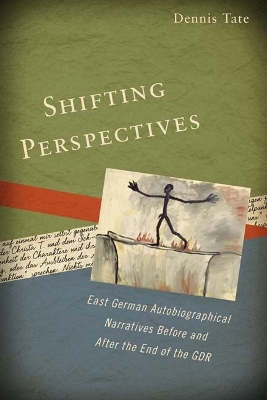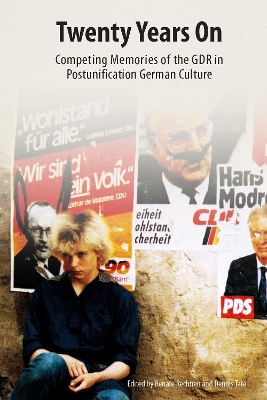Studies in German Literature, Linguistics, and Culture
2 total works
A striking feature of today's German literature is the survival of an East German subculture characterized by its authors' self-reflexive concern with their own lives, not only in texts labeled as autobiography but also those in the more ambiguous territory of what Christa Wolf has called "subjective authenticity." Dennis Tate provides the first detailed account of this phenomenon: its origins in the 1930s' exile debates, its evolution during the GDR's lifespan, and its manifestations in the work of five East German authors still widely read today: Brigitte Reimann, Franz Fuhmann, Stefan Heym, Gunter de Bruyn, and Christa Wolf. Tate shows how the preoccupation with self arose fromthe unusually turbulent circumstances in which this generation has lived. Having succumbed early to the temptation to simplify their life stories for misguided educational purposes, these authors have repeatedly reconstructed their personal and political identities as their perspectives on the past have shifted. Tate shows the importance of viewing their autobiographical writing as a multilayered historical process, exposing problems with canonical accounts of East German literature and enabling texts published under GDR censorship to be properly appreciated for the first time.
Dennis Tate is Professor of German Studies at the University of Bath, UK.
Dennis Tate is Professor of German Studies at the University of Bath, UK.
New essays on the evolution of cultural memory of the former German Democratic Republic since 1989-90 and its importance for Germany's continuing unification process.
Twenty years on from the dramatic events that led to the opening of the Berlin Wall and the collapse of the GDR, the subjective dimension of German unification is still far from complete. The nature of the East German state remains a matter of cultural as well as political debate. This volume of new research focuses on competing memories of the GDR and the ways they have evolved in the mass media, literature, and film since 1989-90. Taking as its point ofdeparture the impact of iconic visual images of the fall of the Wall on our understanding of the historical GDR, the volume first considers the decade of cultural conflict that followed unification and then the emergence of a morecomplex and diverse "textual memory" of the GDR since the Berlin Republic was established in 1999. It highlights competing generational perspectives on the GDR era and the unexpected "afterlife" of the GDR in recent publications.The volume as a whole shows the vitality of eastern German culture two decades after the demise of the GDR and the centrality of these memory debates to the success of Germany's unification process.
Contributors: Daniel Argelès, Stephen Brockmann, Arne De Winde, Wolfgang Emmerich, Andrea Geier, Hilde Hoffmann, Astrid Köhler, Karen Leeder, Andrew Plowman, Gillian Pye, Benjamin Robinson, Catherine Smale, Rosemary Stott, Dennis Tate, Frederik VanDam, Nadezda Zemaníková.
Renate Rechtien is Lecturer in German Studies, and Dennis Tate is Emeritus Professor of German Studies, both at the University of Bath, UK.
Twenty years on from the dramatic events that led to the opening of the Berlin Wall and the collapse of the GDR, the subjective dimension of German unification is still far from complete. The nature of the East German state remains a matter of cultural as well as political debate. This volume of new research focuses on competing memories of the GDR and the ways they have evolved in the mass media, literature, and film since 1989-90. Taking as its point ofdeparture the impact of iconic visual images of the fall of the Wall on our understanding of the historical GDR, the volume first considers the decade of cultural conflict that followed unification and then the emergence of a morecomplex and diverse "textual memory" of the GDR since the Berlin Republic was established in 1999. It highlights competing generational perspectives on the GDR era and the unexpected "afterlife" of the GDR in recent publications.The volume as a whole shows the vitality of eastern German culture two decades after the demise of the GDR and the centrality of these memory debates to the success of Germany's unification process.
Contributors: Daniel Argelès, Stephen Brockmann, Arne De Winde, Wolfgang Emmerich, Andrea Geier, Hilde Hoffmann, Astrid Köhler, Karen Leeder, Andrew Plowman, Gillian Pye, Benjamin Robinson, Catherine Smale, Rosemary Stott, Dennis Tate, Frederik VanDam, Nadezda Zemaníková.
Renate Rechtien is Lecturer in German Studies, and Dennis Tate is Emeritus Professor of German Studies, both at the University of Bath, UK.

